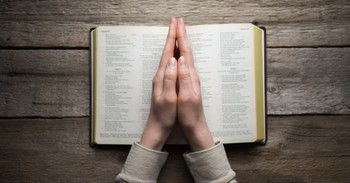The short answer is: Yes — it can be absolutely appropriate for Christians to celebrate Jewish holidays, provided we do so:
with an understanding of their significance
with a reverence for why they were initiated
with an understanding of where they can be found in the Bible and tradition.
Since our Lord, Jesus Christ, was Himself a Jew who observed holy days appointed by God, we may wonder if we should follow His example, or if His death and resurrection made those observances “unnecessary.” Perhaps we may believe that holidays that began with the Jewish people should only be celebrated by Jews. Since we aren’t Jewish by culture and faith, we may wonder whether it doesn’t make sense to share in their special feast days.
But there is nothing about the New Covenant between God and man –made possible through Jesus’ sacrifice– that makes these holidays “off limits” to Christ-followers. Quite the contrary. Just as God expects us to remember all of His marvelous deeds throughout the Bible, we are also called to celebrate them. Though we may not be Jewish, we too can trace our spiritual ancestry back through Adam and Eve, Abraham, and other biblical figures who were part of God's Covenant. Therefore, the Christian believer may legitimately join in these appointed times. The Fellowship of Israel Related Ministries (FIRM) agrees in their article, “Should Christians Observe the Jewish Holidays?” They write, “Jewish holidays are not merely cultural commemorations but profound expressions of faith. They are rooted in biblical events that highlight God’s relationship with His people. Celebrating the holidays alongside the Jewish people can be a way of celebrating God’s faithfulness to them.”
We can further explore what Scripture says, why many Christians (including Messianic Jews) choose to observe the Jewish feast days, how to participate respectfully, and a quick guide to major feasts such as Passover, Pentecost, and the Fall Feasts (and Hanukkah). Then, you can determine for yourself and your family if participating in Jewish holidays is a way to honor and glorify God.
What Does the Bible Say about Christians and Jewish Holidays?
When we ask, “Should Christians celebrate Jewish holidays?”, we can find several principles to help guide us:
Jesus Himself observed them.
Jesus was born into a Jewish family and culture, attended synagogue, observed Jewish festivals, and fulfilled them in His person and work. For example, He was in Jerusalem during the Feast of Tabernacles (John 10:22-23) and shared the Passover meal with His disciples (Matthew 26:17-30). This provides a clear precedent: the Messiah honored the appointed times of the Lord.Believers become united with Jesus regardless of ethnicity.
The apostle Paul writes: “There is neither Jew nor Greek, there is neither slave nor free, there is no male and female; for you are all one in Christ Jesus.” (Galatians 3:28). He goes on to say that if you belong to Christ, you are “Abraham’s seed and heirs according to the promise” (Galatians 3:29). Our standing before God is not based on cultural or ethnic identity, but on faith in Christ. Yet that reality doesn’t erase our connection to the Jewish roots of our faith.The Feasts were appointed by God and rooted in redemptive history.
The article by FIRM states that the Jewish holidays are “days appointed by God Himself” and that “engaging with these observances can enrich one’s faith and understanding of Scripture.” The festivals commemorate many of the key events of Israel’s history — the Exodus, the giving of the Law, the wilderness journey, the ingathering of the harvest — all of which point toward the work of Christ. These are not just cultural festivals, but reminders of theological truths.Freedom in Christ keeps us free from legalism.
While the Bible does not command that Gentile believers follow every Mosaic regulation (Paul argues vigorously against the yoke of the law for Jews and Gentiles alike in Galatians), it also doesn’t forbid the feasts. The key is our heart’s motive and freedom. FIRM remarks: “Observing Jewish holidays should not be seen as a requirement for salvation or favor with God but as a voluntary expression of faith and heritage.”
Thus, from a biblical standpoint: Yes, Christians can celebrate Jewish holidays, and doing so can deepen our faith and understanding. However, it must be done with an eye toward honoring the God who called for these celebrations and His magnificent provision demonstrated in all of them.
Before we look further into why some choose to celebrate these days, and how to participate, let’s take a closer look at what celebrations we are talking about.
Quick Guide: Passover, Pentecost, and the Fall Feasts Including Hanukkah
Here is a brief overview of key Jewish holidays:
Feast | Calendar Date | Christian Significance | Ways to Observe |
Passover (Pesach) | Spring | Commemorates Israel’s deliverance from Egypt; Jesus shared the Passover with His disciples; Jesus became the Passover lamb who takes away the sins of the world. | Share an adapted Seder meal: include unleavened bread, bitter herbs, commentary on Christ’s sacrifice; time of repentance and thanksgiving. |
Feast of Weeks / Pentecost (Shavuot) | 50 days after Passover (late spring) | In the Old Testament it celebrates the giving of the Law; in Acts 2 the Holy Spirit is poured out on the church. | Celebrate with a worship service focused on the Holy Spirit, include a teaching on the giving of the Law and how Christ fulfills it, talk about how the Holy Spirit works in our lives today. |
Feast of Trumpets (Rosh Hashanah) | Early fall | Marks the new year in the Hebrew calendar; symbolizes God’s sovereignty, (trumpets represented God’s power in the Old Testament); trumpet blast will precede the final return of Christ. | Hold a time of reflection, repentance, worship with trumpets if possible; focus on Christ’s coming as King and Judge. |
Fall | Jewish Day of Atonement; Christians reflect on Christ’s atonement, repentance, renewal. | Quiet time of confession, forgiveness, scripture reading on Christ’s atoning work, communal prayer for forgiveness. | |
Feast of Tabernacles (Sukkot / Feast of Ingathering) | Tishri 15-22 | Commemorates Israel dwelling in tents in the wilderness; points to the Messiah “dwelling” among us (John 1:14) and God’s provision in the “tent” of Christ. | Build or use a temporary “sukkah” (tented shelter), dinner inside it, reflect on God’s provision and the idea of pilgrimage, encourage faith journeys. |
Hanukkah (Festival of Lights) | Kislev 25 (winter) | Not one of the original biblical feasts but was observed by Jesus (John 10:22-23). Symbols of God’s amazing provision and light over darkness are also common New Testament themes. | Light menorah candles, discussing Christ as “the light of the world,” include a time of gospel story sharing and hospitality. |
These feasts offer a rhythm of worship throughout the year that correspond to God’s story of redemption. As such, when Christians celebrate these feasts they can share the original story of the event(s) and then discuss how they point to God’s saving work in Jesus’ sacrifice.
Why Some Christians (including Messianic Jews) Choose to Celebrate Jewish Feast Days
There are several good reasons why many Christians — especially within the Messianic Jewish movement —may choose to observe the Jewish feast days:
To feel a closer connection to our heritage. As we observe these feasts and holy days we can dig deeper into what it was like to be Yahweh’s chosen people. It should give us a greater reverence for our Heavenly Father and how he cared for His people, and gave them the opportunity to thank and celebrate Him.
To enter more into the earthly life of Christ. If we participate in events such as a Seder meal at Passover, or lighting of candles at Hanukkah, we can imagine how special these times must have been for Jesus. He knew His Father was the One being acknowledged, but could also experience them as a human with fellow believers. It must have been so gratifying for Jesus to honor His Father with others on these days.
To enter into the beauty of theological symbolism. Many feast days resonate with Christian theology, for example, Passover prefigures Christ as the Lamb of God; Pentecost connects to the gift of the Holy Spirit; Sukkot (Tabernacles) reminds us that “the Word became flesh and dwelt (tabernacled) among us” (John 1:14).
Fostering unity and gratitude. By participating in these feasts along with Jewish brothers and sisters, believers can express solidarity and gratitude for the faithfulness of God to Israel through the ages. FIRM writes: “It can foster a sense of unity among believers, bridging historical and theological divides.”
For these reasons many Christians choose to observe some or all of the biblical feasts, not out of obligation, but out of appreciation to God, a desire for greater understanding, and a heart full of deeper worship.
Key Cautions: Avoiding Confusion, Pressure, or Cultural Insensitivity
While celebrating Jewish holidays can be enriching, there are important cautions to keep in mind. Here are some pitfalls and how we might avoid them:
Don’t believe you are more right with God by celebrating these feasts.
Observing Passover, Pentecost, or Sukkot does not make one more righteous before God. Paul was clear: we are saved by faith in Christ, not by works of the law (Galatians 2:16). The freedom that Christ gives us means we can celebrate without feeling compelled, burdened, or superior.Don’t appropriate culture insensitively.
Many of these festivals are held by Jewish communities with deep historical and cultural significance. When Christians participate, we must do so with respect, humility, and a desire to learn, not to co-opt or bypass that heritage, even though we share a spiritual ancestry.Avoid theological confusion about the Old and New Covenants.
Some Christians may misinterpret the feasts to mean that all Old Covenant practices are to be followed by all Gentile believers to be accepted by God, or alternatively that the Church supersedes God’s covenant with Israel in every way. We must hold to the facts that the feasts point to Jesus, the law was fulfilled in Him, and our identity is as repentant, forgiven and saved believers.Consider sensitivity to Jewish-Christian relations over the centuries.
Many Jewish communities have had painful relationships with Christian history (e.g., forced conversions, anti‐Semitism). When Christians celebrate Jewish festivals, it is wise to do so graciously and not in a way that ignores that history or implies that Jewish people must convert to Christianity. Our posture should be one of gratitude and solidarity, not conquest. We leave room for the Holy Spirit to change hearts.
Therefore, celebration is possible and blessed by God, but must be done reverently as in all things regarding our relationship with our Creator and Savior.
How to Participate Respectfully (If You Choose To)
If you feel led to observe one or more of the Jewish feast days in your church or personally, here are some helpful guidelines:
Start with prayer and study. Before jumping in, spend time reading the biblical texts about the feast, the New Testament references, and its meaning for your Christian walk. Doing so helps anchor the celebration in Scripture rather than tradition alone.
Honor the roots and context. Acknowledge the Jewish origin of the feast. You might include teaching about how Jesus and the early believers observed the festival, and why this matters for Christians today. Use resources such as the FIRM article or Messianic Jewish teaching to deepen your understanding.
Focus on Christ’s fulfillment. While you may honor the historical aspect of the feast, make sure your worship points to Jesus–His life, death, resurrection, and return. For example, a Passover meal might include reflection on Christ as the Lamb of God; Yom Kippur might include meditation on what Jesus did to atone for the sins of the world.
Invite openness and respect for both traditions. If you involve a Jewish friend or Messianic Jewish believer, invite them to share traditions, insights, and the significance from a Jewish perspective. This can lead to greater unity and respect from both sides.
Avoid burden or requirement. Make clear that observing the feast is optional, rather than mandatory for Christian faith. Encourage freedom, not compulsion.
Consider outreach and hospitality. Some feasts lend themselves to hospitality (e.g., inviting guests to a Seder meal). Use the opportunity to invite unbelievers to experience the story of God’s redemption and the beauty of Christian faith rooted in Jewish tradition.
By considering these steps, Christians can celebrate the Jewish feast days in a way that honors God, honors the Jewish roots of our faith, and deepens our own discipleship in Jesus.
To Celebrate or Not to Celebrate?
To celebrate or not to celebrate? The honest answer is: it depends on your motive, your community, and your heart posture. For Christians who recognize the Jewish roots of our faith, who desire to enrich their discipleship by walking more deeply into the story of God, who have the cultural sensitivity and theological clarity to do so — yes, it is absolutely okay to celebrate Jewish holidays. Jesus did so; the apostolic writers honor our unity in Him; the appointed feasts belong to God and enrich our understanding of Him.
On the other hand, celebration must never become a burden, a requirement for righteousness, or a way of imposing on others. It must not become cultural appropriation or ignore the significance of the Jewish people’s ongoing identity in God’s redemptive plan. Instead, it must be done with freedom, joy, humility, a desire to learn, and a clear recognition that our faith is in Christ alone.
If you participate, let these festival times become opportunities to deepen your walk with the Lord, to connect with the ancestral roots of your faith, and to rejoice that we who were once far have been brought near. Whether you observe Passover this year, build a sukkah, sound a trumpet, or light a menorah — do so in honor of the One who called you, redeemed you, and grafted you into the vine: our Messiah Jesus.
Photo credit: ©GettyImages/happy_lark
Mary Oelerich-Meyer is a Chicago-area freelance writer and copy editor who prayed for years for a way to write about and for the Lord. She spent 20 years writing for area healthcare organizations, interviewing doctors and clinical professionals and writing more than 1,500 articles in addition to marketing collateral materials. Important work, but not what she felt called to do. She is grateful for any opportunity to share the Lord in her writing and editing, believing that life is too short to write about anything else. Previously she served as Marketing Communications Director for a large healthcare system. She holds a B.A. in International Business and Marketing from Cornell College (the original Cornell!) When not researching or writing, she loves to spend time with her writer daughter, granddaughter, rescue doggie and husband (not always in that order).




